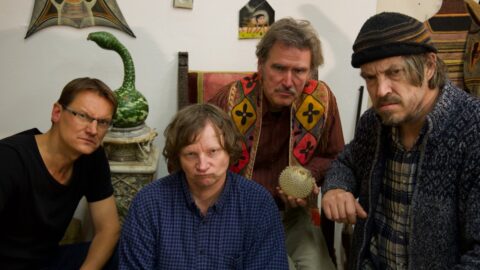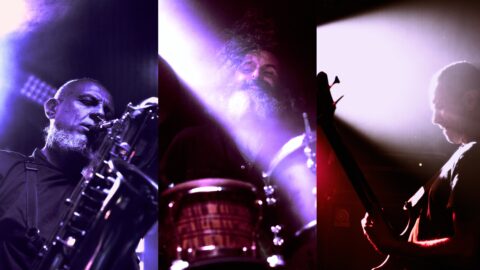When Bob Dylan switched to electric guitars in the 1960s, a similar revolution took place in Greece. But the generational change took place in a different musical context. The Farfisa organ and the wailing bouzouki played in wild, Greco-Turkish rhythms. While this trend escaped Western Europe, it intensely affected the Balkans, Israel and even India. European audiences discovered this music belatedly, having absorbed Goran Bregović and styles from the Balkans. Others who blazed the trail for the revival were the world-famous bands Boom Pam, Ouzo Bazooka and Shot'nez from Israel, as well as the American-Israeli line-up Balkan Beat Box. Deli Teli are the first group to bring the phenomenon back to an authentic Greek perspective. At the core of their style is tsifteteli, which refers to several things at once: rhythmic construction, fun in semi-legal taverns and belly dancing that fuses Greek music with Middle Eastern styles. On stage, Deli Teli create a magical atmosphere, conceived through the eyes of Greeks living in Marseille, who, thanks to distance, distinguish false stereotypes from authentic Greek music.
Do we know Greek music? Greeks claim that their culture is a victim of stereotypes created by foreigners. Deli Teli corrects this false mirror. They are returning to the music that Greeks played for themselves, not for tourists. In the city’s taverns and fishermen’s spelunkers in the 1960s, a time when traditional music was undergoing a transformation. Electric instruments were coming into play, and a new generation was bringing revolutionary aesthetics – Farfisa keyboards and wailing electrified bouzouki played in wild, Greco-Turkish rhythms. At the core of Deli Teli’s style is tsifteteli, which refers to several things at once: rhythmic construction, fun in semi-legal taverns, and belly dancing that fuses Greek music with Middle Eastern styles. Deli Teli’s concerts are characterized by an infectious energy and a subtle dose of Mediterranean drama, and a number of forgotten hits that once set Athens on fire.
The musical visionary Aristides Seisanas (1940-1992), a musician and singer who introduced Greek music to Israeli audiences in the 1950s and 1960s, played a historic role in this era. He was born in Kalamata, in the south of the Greek Peloponnese peninsula, known for its finest black olives. At the age of 17, he took a boat to Israel, where he performed under the stage name Aris San. His venue became a nightclub in Yaffo, a southern suburb of Tel Aviv, where a strong Greek-Jewish immigrant community lived. He was the first to play the electric bouzouki as a guitar. San then wrote the hit Boom Pam, which went down in history as an evergreen, and as the name of an Israeli band that formed in 2003.
Yes, it is a heated story, but that is not an exceptional case in the history of Greek music. The music of Deli Teli, like that of dozens of other Greek groups, is imprinted with the style of rembetiko, originally the music of Greeks from what is now Turkey who were forcibly displaced to Greek territory in the ethnic cleansing after World War I. Their music, with strong oriental influences, then created a unique musical form known as “Greek blues”. Rembetiko differs musically from American blues, but the common feature is the social role. It is a form of testimony and hope. This too is reflected in the repertoire of Deli Teli.





















